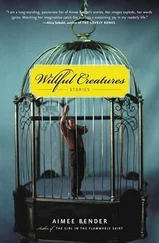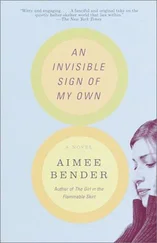What is it? Rose? It’s the pie?
You feel so bad , I said, to the floor tile.
What do you mean? she said, touching my shoulder. Are you talking to the floor? You mean me again, Rose?
You’re so sad in there, I said, and alone, and hungry, and sad-
In where? she said.
In the pie, I said.
In the pie? she said, flinching. What do you mean, baby?
Not baby, I said. No more baby.
Rose? she said, eyebrows caving in. The sheets of tears came down over me again. Blurring. I clawed at my mouth. What are you doing? she said, grabbing my hands. Honey?
I pulled away from her. I tasted it, I said, pitching.
But, Rose, she said, tasted what-
I TASTED YOU, I said. GET OUT MY MOUTH.
She drove me to the emergency room. I cried on the whole drive over, and I cried all through the waiting time, in the plastic chairs. Eventually, the doctor came in, and gave me a shot, and put me in a bed. She’s inconsolable, I heard my mother say, her voice high with concern, as I drifted off.
The doctors didn’t know how to diagnose me, but I did have a delusion, they said, about my mouth. I stayed six hours in the wing off the emergency room of Cedars-Sinai Medical Center that day, taking tests, answering questions, peeing into a cup.
We arrived at around ten-thirty in the morning, and after I calmed down, and the shot wore off, and after a few hours of basic medical work-ups, a tall male doctor with half-moon spectacles came into the room where I was recovering. I rested in bed, silently. Embarrassed by the scene I’d made.
My mother sat in a side chair, nervously cleaning out her purse. The room around us was painted in layers of beige-a dark beige trim, an ivory wall, and a tastefully framed watercolor of some straw in a vase.
He sat down on the edge of my bed, and asked me a list of questions. How I felt. If I slept. What I ate.
Your bedtime is eight-thirty? he asked, writing it down.
Yes.
And you wake up at?
Seven.
And do you wake up in the middle of the night?
Sometimes.
He scribbled something on the chart. Why?
Just some days, I said. I wake up at two.
Mom wrinkled her nose, as if something smelled funny.
Just when she’s up, I said, pointing.
The doctor turned to Mom. Ah, he said, sympathetically. Insomnia?
Oh no, Mom said. Just a little restlessness.
Oh sure, the doctor said. Restlessness, I know that. You from here?
Bay Area, Mom smiled.
Bay Area! the doctor said. Such a nice place. I’m from Sacramento.
Oh, really? Did-Mom said.
Excuse me, I said.
They both turned to me.
Am I done? I said.
The doctor opened his mouth to say more but then turned back to his chart. He asked me a few more questions about throwing up, just like the school nurse had, jotting it all down in his boxy doctor-handwriting. Then he left. Mom went out to talk to him. I lay against the pillow and aged many years in that hour on my own. After a while, he and Mom re-entered the room with another doctor and stood at the foot of my hospital bed. Used tissue and sticky candy and worn business cards filled the trash, the dregs of her handbag.
They all stared at me from their heights of adulthood.
Thank you for your help, I said, sitting up straight. I feel better.
They’d served me a hospital bowl of noodle soup, which tasted of resentment, fine and full. I ate it all, making sure they could see. I ate each of the salt crackers, tucked in their ridge-edged plastic wrapping, factory-made in East Hanover, New Jersey.
I’m very sorry, I said. Did I have a fever?
You know you can’t remove your mouth, the tall doctor said.
I know, I said. It’s part of my body.
The other doc scratched her head. But-
I don’t know why I said that, I said. I was feeling sick.
My mother, standing to the side, leaned in. Is she-she whispered to the taller doctor.
Both doctors tilted their heads. She seems to be okay. Give her time, they said. Perhaps it’s an isolated incident.
I finished my soup. Changed back into my clothes while they gave my mother papers to sign. An old man in a wheelchair rolled past our doorway. Out in the hall, the fluorescently lit corridors lent a dull glow to the white linoleum floor, making it hard to tell the time of day, but I caught a glimpse of a far window, floor-to-ceiling, lit yellow with the blaze of a fading afternoon.
As my mother finished the paperwork, the doctor handed me a cherry lollipop, popped out from a factory in Louisiana where, once flavored, the hot sugar cooled on a metal table of small circles and then got stamped onto a white cardboard rod. Not a single hint of a person in it. Thank you, I said. I ate it down to the stick.
In the parking lot, I opened the car door carefully and settled into my seat.
Thank you for taking me, I said.
Of course, Mom said, backing out.
Were the tests okay?
They were okay, she said.
She threaded her fingers through the steering wheel, driving as if she wanted to pull the wheel into her chest.
The traffic was thick on 3rd Street. Some sort of walk-a-thon was happening. The stores, with dresses in windows, with blown-glass vases, packed with browsing people.
I scared you, I said, in a small voice.
She sighed. She reached over, and stroked my hair with her hand. You did scare me, she said.
I’m sorry.
Oh, Rose.
I won’t do it again, I said.
She rolled down her window and stuck her elbow out, her fingers on the side of the car, drumming.
You said-Oh, never mind. Let’s just get you home.
What?
You said I was feeling bad, that I’m so unhappy, that I’m hardly there, she said.
I did? I said, although I remembered the whole conversation like it had been recorded. From the open window, fresh air sifted through the car. It was almost four o’clock by now, and the sunlight was gold and streamy.
I’m fine, she said. I just want you to know, baby girl. I don’t want you to be worrying so much about me.
She said it, and she looked over, and her eyes were big and limpid, a dark-blue color like late-day ocean water. But in the look was still that same yearning. Please worry about me, I saw in there. Her voice not matching her eyes. I knew if I ate anything of hers again, it would likely tell me the same message: Help me, I am not happy, help me -like a message in a bottle sent in each meal to the eater, and I got it. I got the message.
And now my job was to pretend I did not get the message.
Okay, I said.
She turned on the radio. We listened together to a program with quiz questions, about words that had multiple meanings. I couldn’t concentrate very well, and I just watched the houses and stores slip by on Fairfax, fwip, fwip, momentarily in view, then gone.
It can feel so lonely, to see strangers out in the day, shopping, on a day that is not a good one. On this one: the day I returned from the emergency room after having a fit about wanting to remove my mouth. Not an easy day to look at people in their vivid clothes, in their shining hair, pointing and smiling at colorful woven sweaters.
I wanted to erase them all. But I also wanted to be them all, and I could not erase them and want to be them at the same time.
At home, Joseph was nicer to me than usual and we played a silent game of Parcheesi for an hour in the slanted box of remaining sunlight on the carpet. Dad came by and brought me a pillow. Mom went to take a nap. Joseph won. I went to bed early. I woke up the same.
My parents met at a garage sale, held by my dad’s college roommate. All three were in their senior year of college at Berkeley, and Dad’s roommate, Carl, was an unusually fastidious type for someone in his early twenties. He oiled door hinges, for fun. Dad, a natural slob, said he would sometimes open up the freezer just to look at the frozen food stacked in such nice piles, corn bags nested on top of pizza slabs.
Читать дальше












